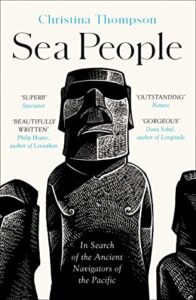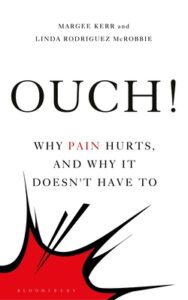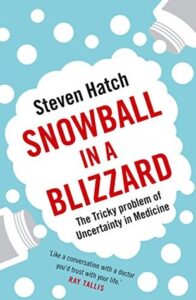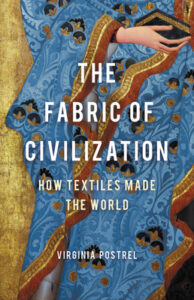Posted August 14, 2021 by Nicky in Reviews / 2 Comments
 Sea People: In Search of the Ancient Navigators of the Pacific, Christina Thompson
Sea People: In Search of the Ancient Navigators of the Pacific, Christina Thompson
Christina Thompson’s husband, Seven, is Maori — but Thompson herself is not. This book is mostly about the history of the Polynesian peoples from a Western-eye view: the “discovery” of the islands, and our questions and experiments and concerns about the Polynesian past and where everyone came from. I’d been hoping for something a little closer to the subject matter, even if not written by a person from Polynesia, but it’s very much from an outsider’s point of view, focusing on what outsiders have learned through anthropological studies, archaeology and later carbon dating, etc.
It’s very readable and pretty enjoyable for what it is, but I felt it was sorely lacking in Polynesian voices. Tupaia, a priest and navigator who chose to sail with Cook, is mentioned, along with some later scholars who were from the area or naturalised there, but… it really feels like “how the West found these islands, and what they made of it once they got there”. I was hoping for something a little more centred on the other point of view.
I was also hoping for a bit more discussion of the archaeology of the islands, but Thompson focuses more on the stories and navigational skills passed down. Still, there are some glimpses of the archaeology and in general it’s a fair introduction to the area and what we’ve figured out about the deeper history of the place. It shouldn’t be surprising for people to learn that the genealogies and stories did contain much useful information that matches what Western methods have found; we respect that when it comes to Norse sagas!
Anyway, enjoyable, if not what I’d hoped for.
Rating: 3/5
Tags: book reviews, books, Christina Thompson, history, non-fiction
Posted August 9, 2021 by Nicky in Reviews / 0 Comments
 Index, a History of The, Dennis Duncan
Index, a History of The, Dennis Duncan
Received to review via Netgalley; publication date 2nd September 2021
Indexes don’t exactly sound like the most scintillating of subjects, I guess. On the face of it, they’re such a utilitarian thing, and most of us don’t give them a second thought. But I really enjoy histories that dig into things we take for granted like this, and it’s usually surprisingly rewarding, so I thought this sounded like a good time — and I wasn’t wrong. It’s not just about the minutiae of how to create a good index (although that’s certainly part of it), but also about people’s attitudes to indexes, and what that says about people’s needs, wants and fears when it comes to literacy and scholarship.
The highlight of the book is probably Duncan’s delighted tour of how to use an index to be truly petty. Would you imagine that an index could cost a politician an election? Well, there’s at least one case where an index was a factor. Can you picture getting one over on your rival with a catty little index entry? There’s some really fascinating stuff lurking behind some indexes, and it’s fascinating.
I also thought the examples of using indexes as a format for telling fiction were interesting; as Duncan says, they don’t quite work because they can’t quite imitate the random, non-chronological format… but there are some really imaginative stories out there which give it a go.
Overall, this was everything I’d hoped for.
Rating: 4/5
Tags: book reviews, books, Dennis Duncan, history, non-fiction
Posted August 8, 2021 by Nicky in Reviews / 2 Comments
 Braiding Sweetgrass: Indigenous Wisdom, Scientific Knowledge, and the Teachings of Plants, Robin Wall Kimmerer
Braiding Sweetgrass: Indigenous Wisdom, Scientific Knowledge, and the Teachings of Plants, Robin Wall Kimmerer
From the reviews and blurbs I read for this, I was expecting something that used scientific knowledge a little more than this. It is there, woven into how the author understands the world… but much of it is autobiography, a memoir of how the author came to understand the world through an amalgam of scientific knowledge and training (she is a botanist) and the teachings of indigenous people. She is Potawatomi herself, though those are not the only traditions she references.
I’m afraid that far from being a spirit-nourishing breath of fresh air, as others have found it, it ultimately struck me as very sentimental. She romanticises indigenous lives and teachings to a huge degree. It’s difficult, because of course much of what she says about the changes colonisation brought to the US is true, and I agree with her about the need to live more constructively with other beings on Earth — I don’t think there’s much I actually disagreed with at all! (I can think of one point: she wants to see ecosystems restored to exactly what they were, while I’m not sure that is always possible or desirable. The clock can’t simply be turned back.)
…And yet, still, I found the whole book very sentimental and a little, I guess, vicariously embarrassing? I’m sure the author would view that to some extent as my poverty of spirit, but on the one hand, I don’t find science so devoid of wonder and warmth as she says, and on the other, I don’t think I need to imbue inanimate objects with innate purpose and souls in order to treat the world with respect.
Admittedly, it also does not help that I don’t share her experiences. Britain has different flora and fauna, obviously, and it’s that which would be more likely to spark off that sentimentality in me; talk about wild blackberries on the side of Caerphilly mountain and I can summon up the right warmth, but I have no idea what sweetgrass even looks like beyond the very vaguest outline.
In the end, just… didn’t enjoy it. Had hoped for more science and less sentiment.
Rating: 2/5
Tags: book reviews, books, non-fiction, Robin Wall Kimmerer, science
Posted August 7, 2021 by Nicky in Reviews / 0 Comments
 Ouch!: The New Science of Pain, Linda Rodriguez McRobbie, Margee Kerr
Ouch!: The New Science of Pain, Linda Rodriguez McRobbie, Margee Kerr
I’d somewhat feared when I picked this book up that it would be unsympathetic to those with chronic pain, in the way that some doctors are at the moment, because the overprescription of opiates is so much on their minds that everyone reporting pain sounds like a drug seeker to them. There is a bit of commentary on the fact that modern people are more likely to report pain and to be afraid of pain, etc, etc, but overall I found that the two authors were fairly sympathetic and willing to seek out multiple views.
One of the authors has experience with chronic pain and a degenerative illness, and both of them make sure to position themselves so the reader understands where they’re coming from — perhaps too autobiographical for some when it comes to popular science, but I think it was valuable in this case. Either way, both seem to have done a lot of research, including hands-on. Their attitude does lean toward “pain is a good thing and painkillers are generally the wrong treatment”, but doesn’t exclude the usefulness of painkillers for some people. It’s mostly sensitive and sympathetic, as I said, including toward the BDSM community, whose attitudes toward pain they also discuss.
It’s a layperson-friendly guide to what we understand about pain, not just biologically (although it does discuss that) but also psychologically and socially… and it discusses not just physical pain, but to some degree emotional pain as well (particularly as you can’t really have one without the other: human experience isn’t neatly divided like that). It was what I’d hoped for from another book which was much more about responses to pain, so that was nice. Overall, it’s super readable, and I flew through it.
Rating: 4/5
Tags: book reviews, books, non-fiction, science
Posted August 6, 2021 by Nicky in Reviews / 0 Comments
 Elephants on Acid, Alex Boese
Elephants on Acid, Alex Boese
I was warned by reviews that Boese covers some abhorrent experiments on animals without any kind of critique, and that’s correct. Boese seems more interested in the shock and amusement factor of some of these experiments, including expecting people to be rather shocked that scientists have tried to study sex in the lab. I actually knew about most of these experiments and findings before, so there was nothing much shocking or surprising for me — except his casual tone about animal experimentation.
(I’m not personally against animal experimentation when necessary, when there’s a possibility of great benefit. I think. It’s a stance that wavers across time, something that I have great difficulty with. What I never change my mind on is unnecessary experimentation: harming animals just to see what happens. Like giving them a massive and deadly overdose of acid, for example.)
It’s a good overview of some “weird” experiments, some of which have produced useful results. Otherwise, meh?
Rating: 2/5
Tags: Alex Boese, book reviews, books, non-fiction, science
Posted August 4, 2021 by Nicky in Reviews / 0 Comments
 Seashaken Houses, Tom Nancollas
Seashaken Houses, Tom Nancollas
This was a complete impulse-buy on my part; something about it just really drew me, in the moment, so I went ahead and grabbed it. I read it right away to try to capitalise on that, and it was the perfect thing for my mood: it’s a history of a number of specific lighthouses and how they relate to the development of rock lighthouses in the UK, but also a personal response to them in many ways –Nancollas’ enthusiasm and interest, along with his imaginings about the lighthouses, really shine through. Do I really care about how the light of a particular lighthouse was installed? Only because he did, and made it sound interesting.
There were a couple of bits I found a bit overly sentimental or kinda purple-prose-y, and I had a roll of my eyes when he referenced King Arthur and got something wrong (Arthur died at Camlann, not anywhere else, in most versions of the Arthurian stories)… but mostly it just really hit the spot. I love it when someone can take a topic that I have very little personal connection to, and make it fascinating. If that sounds interesting to you too, then I recommend this!
Rating: 4/5
Tags: book reviews, books, history, non-fiction, Tom Nancollas
Posted August 2, 2021 by Nicky in Reviews / 0 Comments
 Snowball in a Blizzard, Steve Hatch
Snowball in a Blizzard, Steve Hatch
Snowball in a Blizzard is a great examination of something that goes overlooked far too often — or blown out of proportion in ways that serve weird fringe agendas: the fact that very little in medicine is certain, and it’s not possible to put numbers on many/most things about biology. People forget that when looking for certainty about how to reduce their risk of cancer, or blow it up into something quite different when they want to argue against the importance of vaccines… and it’s really important to understand why there is uncertainty in medicine and what it really means, if you want to make truly informed decisions about your own healthcare. Informing people about this is Steve Hatch’s aim here, and I think he does a great job.
There are one or two points which have suffered a bit in time — for instance, the Rosenhan experiments that he leans on heavily to make a point or two have been discredited, with Susannah Cahalan’s The Great Pretender arguing pretty convincingly that Rosenhan falsified much of the data in his study, which was never run in the way he described. There are also some references to SARS, which are pretty apocalyptic… But broadly speaking, Hatch’s points hold true.
There’s some really fascinating stuff here that I knew very little about. For example, screening mammography — mammograms for people who have not discovered lumps or had any other symptoms of breast cancer — is, on balance, probably harmful for most people. This doesn’t mean that diagnostic mammography is a bad thing, but the indiscriminate screening of everyone in certain groups includes far too many people who are at too low a risk of cancer. Thus, false positives are common, and a lot of mental distress results — and sometimes worse, with people even ending up having unnecessary mastectomies.
Hatch explains the statistics underlying evidence-based medicine really well. I don’t have a good instinctive grasp of statistics, and never have, and this book helped some of these concepts lodge in my brain — which was nice, because I had an exam coming up at that point on exactly some of these types of statistics. I think it would be really useful for anyone who wants to understand better how uncertainty in medicine works and what that might mean for making decisions about your own care.
Rating: 4/5
Tags: book reviews, books, non-fiction, science, Steve Hatch
Posted July 31, 2021 by Nicky in Reviews / 0 Comments
 The Fabric of Civilization: How Textiles Made The World, Virginia Postrel
The Fabric of Civilization: How Textiles Made The World, Virginia Postrel
This book looks at fabric not as an art but as a piece of technology, a scientific endeavour. Separate chapters discuss various themes: how the first thread was made, and the impact of selective breeding and experimentation in finding threads long enough to work with, for instance. I found the chapter on dyes particularly interesting, to be honest.
There was one thing that I found kind of weird, and that was some of the perspectives Postrel takes. Like she defends the low-paid status of women who spun thread because it would be cost-prohibitive to pay them more — cloth would be too expensive if people were paid more, so it can’t be done (instead of valuing people’s work at what it’s worth). And she’s very much automatically on the side of the middlemen who sold cloth for others, saying they were unfairly treated by people who didn’t know the worth of what they did? (Rather than what is more likely which is that it’s a bit of both.) It hits weirdly for me.
The chapter on new fabrics was pretty fascinating as well. I’d kind of like to see this on Great British Sewing Bee: here is this new fabric, here are its properties, make something out of it.
Anyway, overall pretty enjoyable and informative; I wish I was a bit more visual so I could understand exactly what’s going on in some of the descriptions, but that’s not the author’s fault — I can never picture anything, no matter how well you describe it.
Rating: 4/5
Tags: book reviews, books, history, non-fiction, Virginia Postrel
Posted July 28, 2021 by Nicky in Reviews / 0 Comments
 The Mystery of the Exploding Teeth and Other Curiosities from the History of Medicine, Thomas Morris
The Mystery of the Exploding Teeth and Other Curiosities from the History of Medicine, Thomas Morris
The answer to most of the “mysteries”/”curiosities” here is “someone was mistaken or lying”. I was hoping for some weirder tales, to be honest, and some of this is really just “hur hur people swallow weird things sometimes” and “lololol someone put WHAT up their butt?” I was raised by a doctor, none of this is a shock to me, though I’m gonna provoke an internal wince in anyone in my family by just mysteriously leaving one word here: “lightbulbs”. (It’s probably worse than you’re imagining.)
It’s a fun enough light read, though for me it really harped too much on obvious hoaxes, misunderstandings and just the weird things people do that isn’t particularly interesting except that it’s sex-related and idiotic so it’s a reliable source of humour for some people.
Rating: 2/5
Tags: book reviews, books, history, non-fiction, science, Thomas Morris
Posted July 26, 2021 by Nicky in Reviews / 0 Comments
 Walls: A History of Civilization in Blood and Brick, David Frye
Walls: A History of Civilization in Blood and Brick, David Frye
This book has one major thesis, which it argues fairly well: walls made civilisation possible. Walls are contrasted against wars, with warmongers living a more day-to-day existence and wall-builders creating culture, politics, philosophy, technology, etc. As you read it, at least, it seems pretty convincing — but of course, Frye chooses his examples carefully, and doesn’t provide any counter-arguments of times and places where people created art without being walled in, had complex social contracts that allowed for safety and self-expression without carefully delineated borders.
I don’t have the historical knowledge to properly argue the point, but I suspect that Frye’s version is pretty lopsided. I don’t want to romanticise unwalled cultures either, but by and large humans are more complicated than simple dichotomies like this.
Still, I found it an entertaining survey of world cultures where this did seem to play out, and it’s certainly a very readable book. I wish he’d gone more into the modern relevance of walls, but I don’t think it much suited his thesis to discuss Trump’s wall — hardly a beacon of culture-creation — at great length.
Rating: 3/5
Tags: book reviews, books, David Frye, history, non-fiction
 Sea People: In Search of the Ancient Navigators of the Pacific, Christina Thompson
Sea People: In Search of the Ancient Navigators of the Pacific, Christina Thompson








